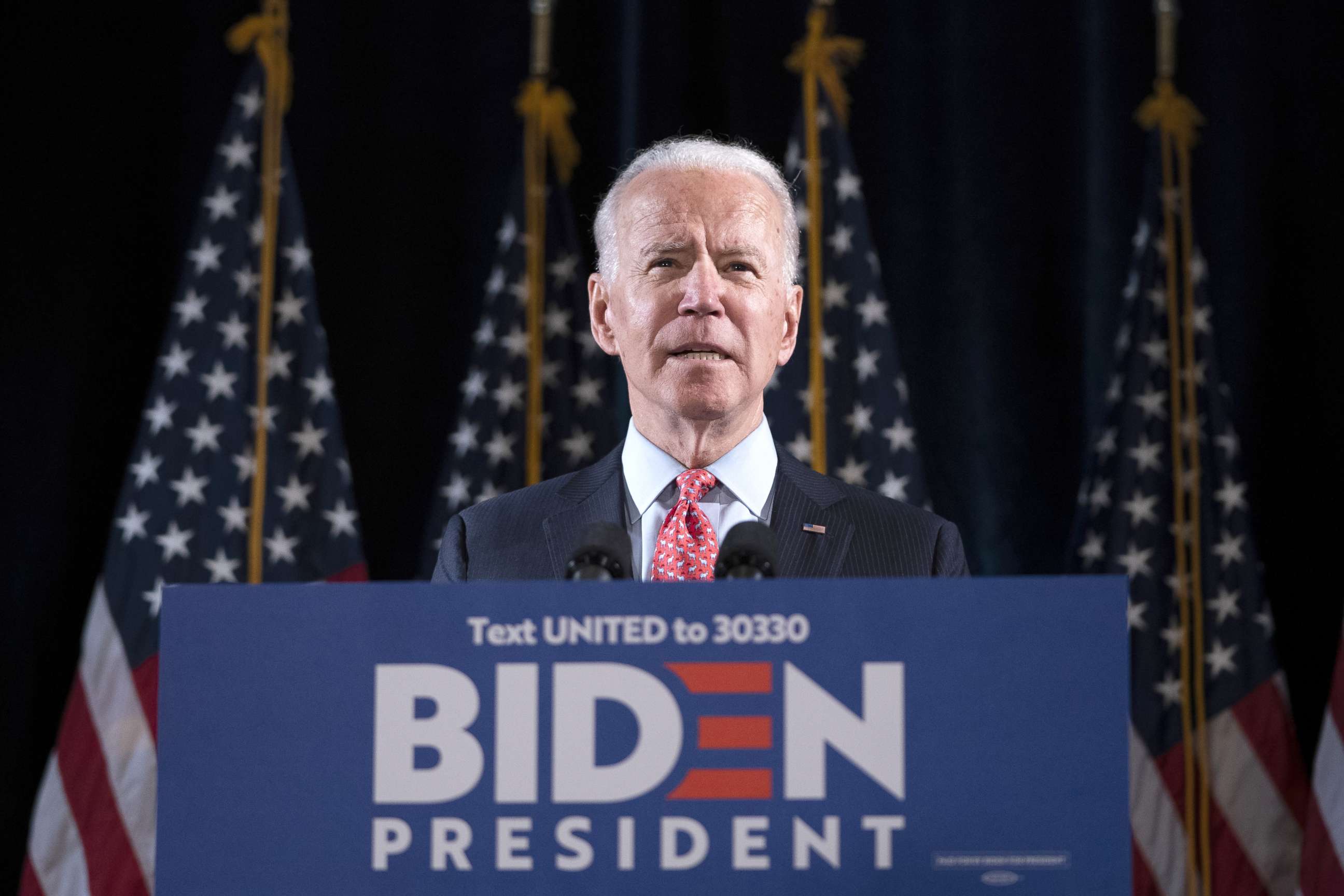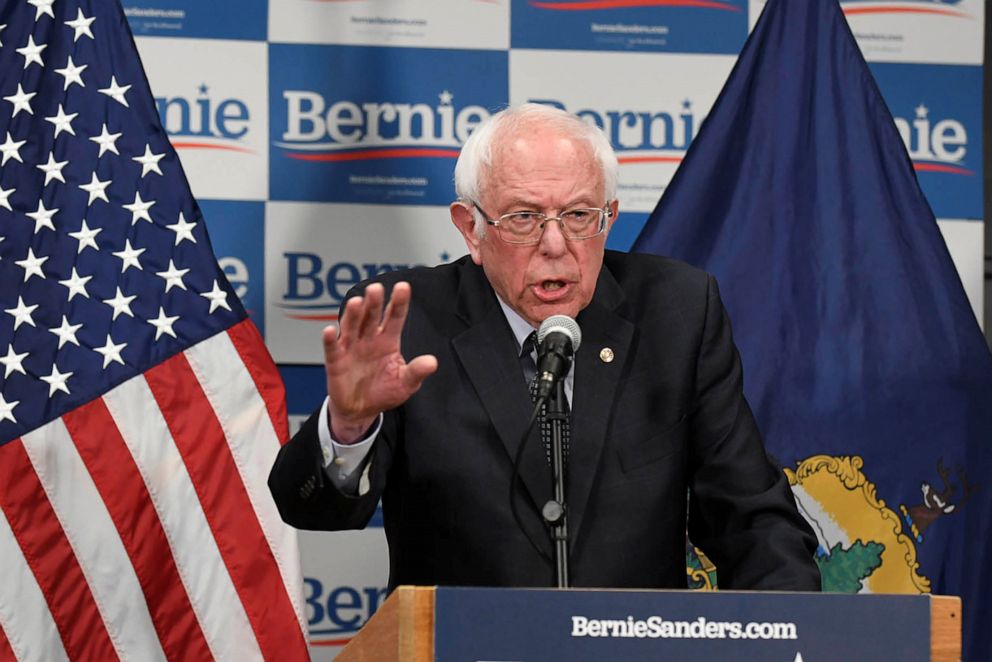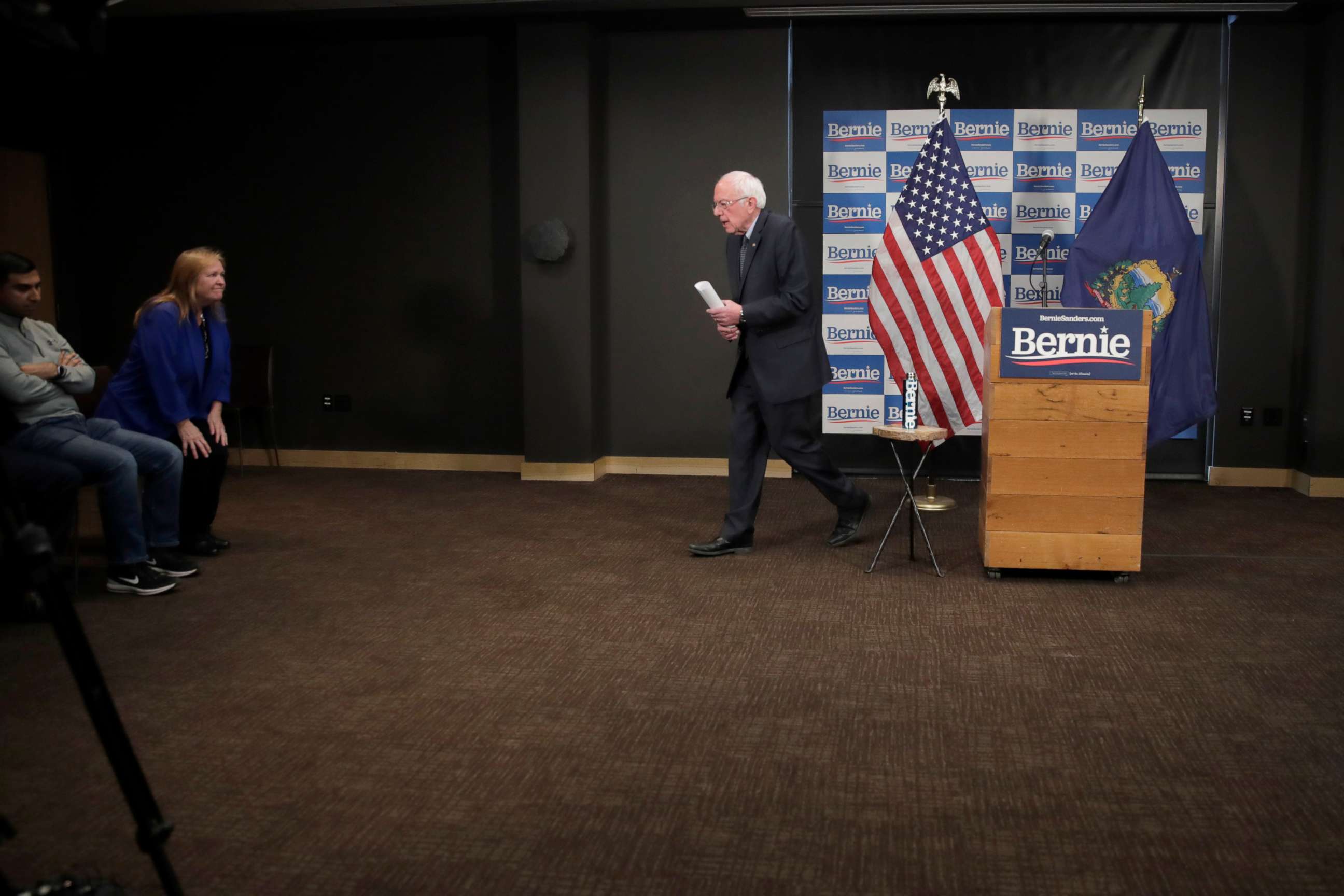The Note: Biden promises stability as national crisis freezes campaign
Biden solidified his front-runner status as campaigning as we know it ceased.
The TAKE with Rick Klein
Who would have guessed that the most stable thing going would be the race for the Democratic nomination?
This week that turned the economy and virtually all of American society upside down came at a peculiar moment in the presidential race. Former Vice President Joe Biden solidified his status as the likely Democratic nominee at virtually the instant that campaigning as we've known it had to cease.
President Donald Trump, meanwhile, has a presidency-defining crisis on his hands. His response has been marked by misinformation and contradictory directions, as a favorite campaign metric -- the stock market -- defies him and the nation begins an unprecedented kind of lockdown.

A president who famously promised he "alone" could fix the nation's ills, confronts a nation that's scared and -- increasingly -- sick. According to a two-day ABC News/Ipsos poll released Friday morning, two-thirds of Americans are concerned that they or someone they know will become infected with novel coronavirus -- with 73% concern among those who responded Thursday, compared to 59% on Wednesday.
Yes, there's a Democratic debate coming Sunday, the first that will feature Biden and Sen. Bernie Sanders one-on-one. But with Sanders off the trail and promising more questions than attacks, the moment is primed to belong to Biden, with his promise of steady leadership and basic electability against Trump.
"The coronavirus does not have a political affiliation," Biden said Thursday in Delaware, in outlining his approach to handling a crisis that signaled a shift to general-election footing.
A lack of political affiliation does not mean a lack of political import. A campaign that's already been filled with huge moments is getting what looks like its biggest one yet, with Trump -- for the moment -- not the only star of this show.
The RUNDOWN with MaryAlice Parks
There is a strange irony -- or subtle vindication for the senator perhaps -- in the fact that as Sanders' campaign struggles to figure out its next steps, key components and potential merits of his "Medicare for All" plan, as controversial as they may be, are being debated again in public as a result of the current health care crisis.
"Unfortunately, as I think the American people increasingly understand, our country is at a severe disadvantage compared to every other major country on Earth because we do not guarantee health care to all people as a right," Sanders said, talking to reporters Thursday.
"When you are uninsured or underinsured you hesitate about getting the medical care you need because you cannot afford to get that medical care. ... Millions of our people cannot afford to go to a doctor, let alone pay for a coronavirus test," he added.

Politicians of all stripes this last week have acknowledged -- as Sanders has been saying for years -- that even copays and deductibles for people who have health insurance can be a barrier to entry, a burden too high to get some people in need into the doctors' office.
Washington Gov. Jay Inslee last week issued an emergency order requiring state health insurance companies to waive copays and deductibles for residents in need of tests and to work with patients to see providers out-of-network, if need be.
Trump on Wednesday went so far as to suggest that treatment for the virus might be free from fees from private, for-profit, insurance companies. But that was inaccurate. When pressed by ABC News Chief Anchor George Stephanopoulos, Vice President Pence clarified that insurance companies have agreed to soon waive co-pays on coronavirus testing nationwide.
"We don't want any American to be concerned about the cost of getting testing, George," Pence said on ABC's "Good Morning America," reassuring some Americans on this topic, but also underscoring that many Americans worry about the cost of medical tests on a regular basis.
The TIP with Adam Kelsey
As the coronavirus pandemic continues to reshape the world's day-to-day activities in a way nearly unprecedented in modern history, the Democratic presidential campaign presses on, albeit with both Biden and Sanders pivoting to spread their messages without being able to hold traditional events and rallies.
Both candidates delivered addresses to the media Thursday, pitching their proposed responses to the COVID-19 outbreak, and they'll debate in a mostly empty television studio in Washington, D.C., on Sunday, but beyond that they'll have to communicate with voters through largely virtual means -- an area in which Sanders may have an advantage.

Though Biden has already announced a "virtual town hall" Friday and his campaign is using its recent influx of donations to ramp-up its live-streams, the concept is routine to the Sanders campaign, which travels full-time with two videographers and has been broadcasting nearly every one of the senator's campaign appearances for the past year on several social media channels at once -- and on nearly all of which Sanders has millions more followers than Biden. On YouTube alone, Sanders has 25 times more subscribers.
The effort has become so robust that even the 78-year-old senator is becoming an expert himself, regularly asking his aides the same question after rallies: "How many people watched the livestream?
ONE MORE THING
Two-thirds of Americans are concerned that they or someone they know will be infected with the novel coronavirus, but in a country with a growing partisan divide, political tribalism is having a large impact when it comes to anxiety over the disease, according to a new ABC News/Ipsos poll released Friday.
THE PLAYLIST
ABC News' "Start Here" podcast. Friday morning's episode features ABC News contributor Dr. Todd Ellerin, who tells us why testing remains the biggest concern in the coronavirus pandemic. Then, ABC News Chief White House correspondent Jonathan Karl has more on the mixed messaging from the Trump administration. http://apple.co/2HPocUL
WHAT YOU NEED TO KNOW THIS WEEKEND
- Former Vice President Joe Biden holds a virtual town hall with Illinois residents at 4 p.m. (CDT).
- President Donald Trump meets with industry executives on the U.S. response to the novel coronavirus at 1:30 p.m. in the White House.
- The Northern Mariana Islands holds its Democratic primary contest on Saturday with six delegates up for grabs.
- A Democratic debate will be held Sunday and feature Biden and Sen. Bernie Sanders, I-Vt. Originally scheduled to be held in Phoenix, it has been moved to CNN's studios in Washington, D.C. and will air beginning at 8 p.m.
- Sunday on ABC's "This Week": ABC News Chief White House Correspondent Jonathan Karl interviews Dr. Anthony Fauci, director of the National Institute of Allergy and Infectious Diseases and member of the White House Coronavirus Task Force. Plus, the Powerhouse Roundtable discusses the week in politics, with Associated Press Washington Bureau Chief Julie Pace, ABC News Political Director Rick Klein, Editor-in Chief of The Dispatch, Los Angeles Times Columnist and American Enterprise Institute Fellow Jonah Goldberg and Democratic Strategist and EMILY's List VP of Trainings & Outreach Stefanie Brown James.
Download the ABC News app and select "The Note" as an item of interest to receive the day's sharpest political analysis.
The Note is a daily ABC News feature that highlights the key political moments of the day ahead. Please check back Monday for the latest.




